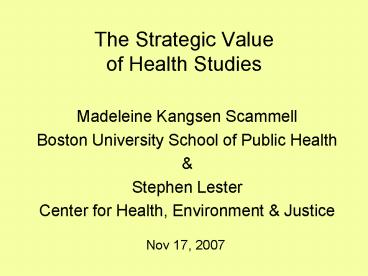The Strategic Value of Health Studies - PowerPoint PPT Presentation
1 / 20
Title:
The Strategic Value of Health Studies
Description:
Boston University School of Public ... Be useful for political leverage in a campaign ... Spectrum of community participation: Community- driven and controlled. ... – PowerPoint PPT presentation
Number of Views:19
Avg rating:3.0/5.0
Title: The Strategic Value of Health Studies
1
The Strategic Value of Health Studies
- Madeleine Kangsen Scammell
- Boston University School of Public Health
- Stephen Lester
- Center for Health, Environment Justice
Nov 17, 2007
2
The Strategic Value of Health Studies
Outline
- Health studies and precaution
- Why a health study?
- positive negative things they can do
- Types of health studies
- Who conducts health studies
- Final notes of (pre)caution
3
Health Studies
- I have a confession to make
- I have Erin Brockovich envy. I would love, for
once, to work on a project where it was clear who
the good guys and the bad guys were, and where I
knew for sure that what I was doing would help
solve the problem. - Rachels 815 - Beyond Erin Brockovich, April 14,
2005 - by Sonja Biorn-Hansen
4
Health Studies Precaution
- Definition of a public health catastrophe
- a health effect so powerful, even an
epidemiologic study can detect it. - -- David Ozonoff, MD, MPH
- Boston University School of Public Health
5
Health Studies Precaution
- Precautionary checklist
- What do we care about?
- What are we trying to accomplish?
- What choices do we have?
- What is the bigger picture?
- Do we know enough to act? Do we know so little we
must act with caution? - Who is responsible?
Chapter 6, Precautionary Tools for Reshaping
Environmental Policy by Nancy Myers
6
Health Studies Precaution
- What do we care about?
- What are we trying to accomplish?
- What choices do we have?
- What is the bigger picture?
- Do we know enough to act? Do we know so little we
must act with caution? - Who is responsible?
7
Why a health study?
8
Why a health study?
- Why do you want to know?
- What is your goal?
- What do you want to know?
- What is your question or concern?
9
(No Transcript)
10
Why a health study?
- To answer a question.
- Why am I sick?
- Why us?
11
Why a health study?
- To answer a question.
- Why am I sick?
- Why us?
Will the proposed trash incinerator that may be
located in our community be safe for our health
and the environment?
Are people in my community sicker than people who
live somewhere else?
Are other people in my community sick?
Am I exposed to chemical X?
What are the major sources of pollution in my
community?
How did we get sick?
12
Why a health study?
13
Types of health studies
14
Who Conducts Health Studies?
- Spectrum of community participation
15
President of the United States Appoints head the
DHHS and the EPA
US Department of Health Human Services (DHHS)
United States Environmental Protection Agency
(EPA)
National Institutes of Health (NIH)
US CDC
ATSDR
10 Regional EPA offices throughout the United
States.
State Department of Health (DOH) or Dept. of
Public Health (DPH)
State Dept. of Environmental Protection (DEP)
Local boards of health (county, town, city, etc.)
16
(No Transcript)
17
Health Survey Negative things they can
do(Center for Health, Environment Justice)
- Force you to constantly defend the credibility of
the survey - Identify health problems you are unprepared to
deal with - Generate statistics which undermine your
organizing efforts - Lead to legal complications over confidentiality
or lawsuits
18
Health Survey Positive things they can
do(Center for Health, Environment Justice)
- Build the credibility of your group
- Create an opportunity for lots of members to help
- Educate your group about a health problem(s) in
your community - Possibly provide evidence which will motivate
community involvement, generate media coverage,
or fulfill other strategic goals.
19
Health Studies Precaution
- Precautionary checklist
- What do we care about?
- What are we trying to accomplish?
- What choices do we have?
- What is the bigger picture?
- Do we know enough to act? Do we know so little we
must act with caution? - Who is responsible?
Chapter 6, Precautionary Tools for Reshaping
Environmental Policy by Nancy Myers
20
Health Studies Precaution
- No matter how good a study may be, someone will
have something bad to say about it. And if it is
a terrible study but people are organized, it
could - move mountains.
- --David Ozonoff (again)































